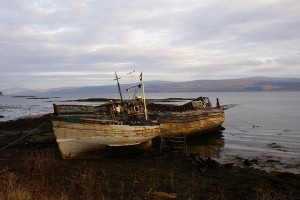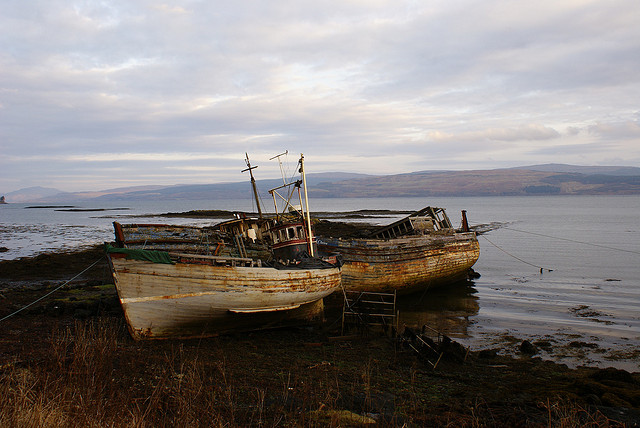 Twenty four attempts. That was the total for the year and it was a record.
Twenty four attempts. That was the total for the year and it was a record.
At least five of them, he knew, could be accounted for by Gregg Sullivan. Five times that fool had gone under, and five times he’d somehow been hauled to the surface. One of the attempts he’d managed to scupper himself, and he remembered wondering at the time whether Gregg looked around first before jumping, just to be sure that someone would hear him hit the water, see him go under and would rush to help him.
One day though, one day he would get it wrong, misread the look in the eyes of a passer by and take it to be concern where, in fact, there was none. One day he would jump and that would be it. Some current he’d never encountered before, some passing tug boat perhaps, whipping up strange currents below, would pull him out further, down deeper, and that would be it.
He believed, that when it happened, Gregg would actually be surprised by it and that, gasping with surprise, he would suck the water inside and be gone. For now though, he was still with them, still waiting for the day.
Twenty four for the year. Was that a lot, he wondered? There were almost a quarter of a million people in the city, so perhaps twenty four was not such a large total, and five alone were Gregg, so if you were to think in terms of people, then perhaps it was as little as nineteen. In relative terms it wasn’t a lot, but it seemed terrifying to him.
Twenty four people springing into a river. A record year. The amazing thing though was that only three of them had actually been successful, if you could call it that. Which meant, if you looked at things optimistically, that around twenty one of them had survived. It was remarkable, really.
He wondered though, if they thought the same themselves. Some of them probably didn’t. Some of them would probably be back this year and some of them would finally make it.
He knew how they felt. Why they did it. It was a long river, too long really to keep track of or patrol. It snaked through the city for miles, and he had a six mile stretch of it to look after.
Six meandering miles through the city centre, under the main bridges, were his. They were treacherous stretches for the unwary. The bridges and the traffic made for peculiar currents and uncertain flows. Of all the stretches, it was the one you had to know really well, if you were to navigate it carefully and without incident. People had warned him to get a bigger boat, one with a small engine. A small wooden rowing boat was ill suited to this river.
But it was just a question of knowing the place, he knew. Of being familiar enough with the waters to respect it and respond to it. This was all that was important. It was nothing to do with boats.
In the very early mornings, he would feel the currents and the tides underneath the boat pulling and tugging at him and he would struggle with the oars to manoeuvre himself upstream. In a small wooden boat you could better feel the river, far better than any bigger vessel, and far, far better than any engine would allow. And he needed to feel the river like that. Feel it moving and shifting below him, alive and strong.
It was magical, he knew that. And at night especially so. The city so quiet, so unlike itself. The orange lights shimmering on the surface, the strong push and pull of underneath, so enticing and melancholic. Feeling this, he knew what it was that drew them to it. He felt it every night. Felt the last things they felt. That water all around pushing you on, drawing you out.
It was what made him come back. The thing that forced him out alone onto the water, to row and float and watch. The last of the midnight rowers to voluntarily patrol a stretch of river.
A few years back, a television crew had joined him, intrigued by what they saw as a rather arduous and lonely form of civic duty. He’d laughed to himself at that, but hadn’t bothered to correct them, and he’d let them send their film out into the world, proclaiming him to be the last living example of a public minded soul. It was far from the truth, but he liked the thought of people remembering him this way.
The crew, he remembered, had found it all a bit amusing in the beginning, that first hour or so on the river, pulling out from the city and heading downstream. Keeping tight to the banks, and to the dank, lush, green river walls. It had been a quiet night, the water calm, the tide very low. But it had been cold, very cold and as the night wore on, just before dawn, he could see the exhaustion in their faces, the grey sleeplessness on their skins. And he could feel their agitation and frustration, as they watched him row, very slowly, back up to town, the sky a watery grey ahead of them, as the sun started to break through.
For a while they had just filmed him as he rowed, no-one saying anything, no-one asking any questions. They knew they were filming something, catching something memorable on film, but at the same time, they didn’t understand it at all, and didn’t quite know what to say, quite what to think. There was a morbidness to it all that made them uneasy.
And he’d realised then that they were probably right. He was the last one. After him, he knew, no-one else would come along and take his place. There would be no more patrols like this once he stopped.
And the question then became – what that would mean?
Would more of them be successful because of it, because of him not being there? Would the numbers rise and rise once there was no-one there to watch out for them, no guardian to stop them going under. They’d asked him this and he’d simply shrugged in reply, because he had no other answer to give them.
Perhaps that was what kept him going, kept him out there every night, year after year, day after day. He could explain it that way he supposed. It was possible. But after the film, he’d started keeping tabs. Had counted year upon year, as the numbers had climbed. Two or three more attempts each year. It seemed not to matter whether he was there or not.
The river authority kept the facts on these sort of things. They knew him well and didn’t think it strange when he had started to ask, each month, what the total was so far.
Only Andy had commented on it.
“Since when did you start counting then, Alex?”
“Since I knew the numbers were going up” had been the only reply he could give.
And Andy had just nodded. He’d worked on that river for more than twenty five years and he knew what Alex meant. The numbers were rising and you didn’t need to count them to know it.
He didn’t try to explain it to himself. To try and figure it out or wonder why. Perhaps it didn’t need figuring, perhaps it was just obvious. The city had changed so much, had gained some and lost some, but on the whole it seemed to have lost.
And it seemed to be losing a little more each day. The river skyline was shifting and changing colour, red bricks disappearing to be replaced by a glass that was watery green in colour, and that seemed to somehow drain away the light rather than reflect it. It was peculiar, that green, sort of anaemic and listless.
The brick buildings had been more robust, more rowdy and dirty. In those spaces, those bustling warehouses, all manner of goods had come in from across the globe, to be sorted and shipped across the country or onwards, to ports further up north.
In the shipyards, tremendous vessels had been constructed. People all over the world had know the names of those ships and what they represented. In those days, the river had been more alive, and the city’s name, known the world over, meant something to people.
And now so much of this was gone, almost as if it had never really existed, and the numbers were rising. Perhaps these changes had nothing to do with it. Perhaps people just preferred to do it this way for the moment. Preferred the water to the alternatives. To the pills and the alcohol, the razorblades and the speeding trains.
These things were cyclical and perhaps just now the river appealed more for one reason or another. He could understand that. There was something less brutal about the river. The idea of simply being swept away, floating down and not feeling your body, just letting the water carry you, hold you up and then pull you under.
He’d often thought that if he were to ever go himself, then this was the way he would choose to go about it. No mess or fuss, just floating away.
He’d become one of the numbers, another story to be added to the river’s history.
One night he would take the boat out for the last time. Gently, he’d ease himself in, before loosening his grip and drifting away. He knew this. He’d always known this.
